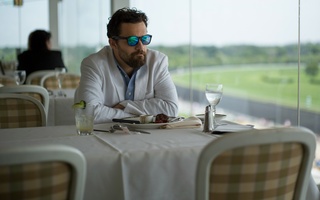At this point, the Asian-American family sitcom Fresh Off the Boat is pretty old news. The show came out three years ago, garnered a lot of critical acclaim, and generally did better than you might expect a show with an all-Asian American cast to do. More interesting than the show itself, however, was the emergence of the man behind the show—or, rather, the man behind the critically acclaimed memoir behind the show. His name is Eddie Huang, and he is a loud, somewhat vulgar ex-lawyer-turned-celebrity-chef who loves hip-hop, sneakers, and authentic Chinese food. When Eddie Huang became famous, people called him the representative of a new wave of Asian Americans. Meanwhile, Eddie once said in a Slate interview that he prefers to refer to himself simply as a “big dick Asian.”
At first, it was a little difficult for me to relate. When Eddie Huang crashed the party, I was just a senior in high school, working diligently to become the best model minority I could be. At the time, I didn’t really have the bandwidth to worry about the things that Eddie wrote about: higher-order needs, like belonging and Asian self-actualization. And one evening, while I was with my family, one of his interviews came on the television and my parents clucked their tongues with disapproval. None of us knew what to make of him—this egg-shaped, verbally aggressive man who laughed way too loudly and wore clothes we’d never seen another Chinese person wear. Certainly no one in my entire extended family resembled this guy in any way. I considered the possibility that Eddie Huang was just too ahead of the curve for us to “get it,” kind of like when the first iPhone came out and it only had one button.
People who follow the show will know that two years ago, Eddie severed ties with Fresh Off the Boat, citing his frustration with the artistic direction that the show had taken. FOTB, Eddie told Vulture magazine, was getting way too “cornstarch.” And he was right. Sometimes after watching an episode I’ll think to myself, Wow, I wish my family was that boring and perfect.
Eddie’s next career move was truly astonishing: He started his own show, which was just about him rather than some made-up version of his childhood self, called Huang’s World—and he aired it on the VICE News Network. Huang’s World is a series of hour-long food documentaries following Eddie on his epicurean travels around the world—to London, Moscow, Detroit, Mongolia—and they’re all brilliant.
In one episode, Eddie travels to Chengdu, the city where I was born and to which I sometimes (begrudgingly) return at the behest of extended family. For context’s sake, Chengdu is a city in the south of China known mostly for being the site of the national panda conservatory. Growing up, my folks would always tell me that Chengdu was a good place to retire because it had 1) the best food, and 2) the most beautiful women in China. In fact, the humid climate and spicy local food is said to cause the “spiciness” of the women. That last bit, by the way, always struck me as a strange way to talk about people, as if they were grapes growing in Napa Valley. Anyway, Eddie’s hour in Chengdu was the most authentic representation of the city I had ever seen—more authentic, really, than many of the tourist brochures that the city itself produces. In one scene, Eddie eats pig brain tofu. Unbelievable, I thought, that this could be on television. It was the first time I’ve ever seen a show and thought, wow, this was really meant for people like me.
Regardless of what you think of his antics, there is no denying the fact that Eddie Huang is a man of integrity. His position as a chef is especially important when you consider the fact that the history of American Chinese food is just a history of immigrants pandering to mainstream tastes. They don’t want pig brain tofu? Fine, let’s just use chicken and pork instead and glaze it with so much sweet and sour sauce that it’s basically barbecue. Gradually, it dawned on me that Eddie Huang is, in fact, a hero of sorts, using his cultural authority to redefine the cultural space of Chinese food. More Yenching, less Kong.
In the “Shanghai” episode of “Huang’s World,” Eddie mentions that he can trace his ancestry back to the Hunan province of China, a region famous for producing many famous revolutionary leaders like Mao ZeDong. When I heard that, I found myself nodding along, thinking yes, that sounds about right.
Hansen Shi ’18 is an English concentrator living in Kirkland House. His column appears on alternate Fridays.
Read more in Opinion
Letter to the Editor: Vote No on Question 2Recommended Articles
-
New Bombing Stirs Peace and Quiet of Soldiers Field, Angers Coaches---Apted Will InvestigateFor the second time this week Harvard coaches have been the victims of bombing outrages at Soldiers Field. Last night
-
TRACK MEN OUT TOMORROWCandidates for the fall track season of five weeks will report tomorrow at 2.30 o'clock at the Locker Building on
-
WHEN GREEK MEETS GREEKToday's game with Tufts will have a far greater importance than that of helping football forecasters to decide whether the
-
GLAMOURThe machinery of government is often halted while the chief executive of the State lays a corner stone; but it
-
 ‘Win It All’ Well-Acted, Poorly Plotted
‘Win It All’ Well-Acted, Poorly Plotted













